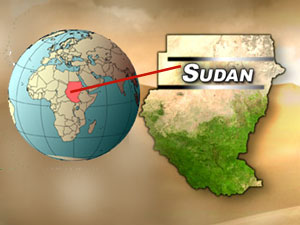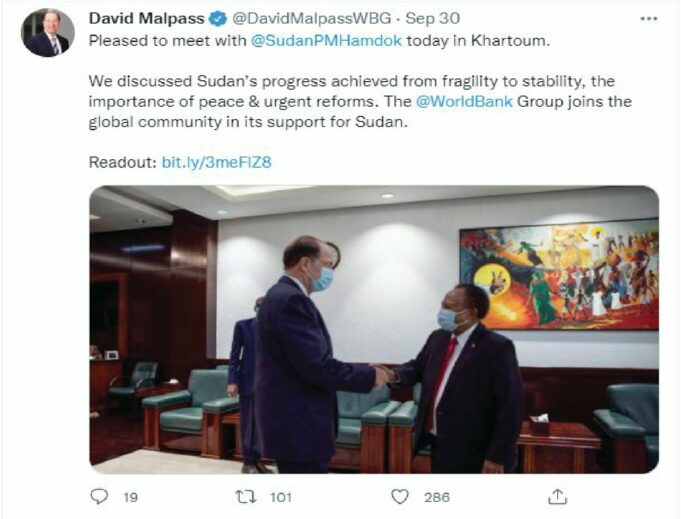Davoe Malpass recently landed in Khartoum, the first visit for a World Bank president to Sudan in more than 50 years, announced Prime Minister Abdalla Hamdok.

The prime minister of the East African nation hailed the visit as a sign that Sudan’s integration into the international community “is progressing in strides,” Hamdoks’s office said.
Malpass tweeted that the World Bank “is eager to support Sudan’s efforts to reduce poverty, boost economic growth & improve livelihoods for all the Sudanese people.” According to the World Bank head, the country that just preceding his visit avoided a—much discussed in the Western press—coup, is making progress as it reconnects with the global economy. But patience is needed as the country seeks to tackle shortages and attract investment.
According to the African Intelligence in a piece headlined: “The scramble for Sudan,” the vultures are scrambling. And the fact that neocolonial, neoliberal interests divided Africa’s largest country that has economically decimated the North and South to the glee of Anglo and Franco powers, is a case in point.
“Deprived of Western goods and services for over twenty years, Sudan was readmitted into the international financial community in late 2020, opening up whole new opportunities for Western multinationals and banks. Washington, London and Paris are using every available lever to plug their business communities into this new Eldorado: writing off debt, lobbying the boards of the IMF and World Bank, funding consultants and deploying specialists,” reported the African Intelligence.
“The secession of South Sudan cost Sudan 75 percent of its oil production, two-thirds of export earnings and over half of its fiscal revenue. By December 2018, the economic decline had led to shortages of fuel, medicine and cash. The tripling of the bread price because of austerity measures imposed by the government sparked demands for regime change that ushered in mass protests,” the article noted.

Then there are the unsolved murders of over 100 protesters and wounding of many more alleged by Omar al-Bashir’s dreaded Rapid Support Forces (RSF) headed by General Mohamed Hamdan Dagala, also known as Hemedti, who serves as the deputy head of Sudan’s ruling sovereign council. And if that isn’t a wakeup call, the military then overthrows the al-Bashir regime, and not the popular uprising.
In an email exchange with Dr. Elnour Hamad, a Ph.D. in education and art education from the University of Illinois in Urbana Champaign, he told Africa Watch that the “Sudanese youth who were the spearhead of December 18th (2018) revolution are frustrated now.” The former researcher at the Arab Center for Research and Policy Studies in Doha, Qatar, and author and columnist for Al-Tayar daily newspaper also said, “Despite their brave sacrifices and blood that was shed, nothing seems to be going in the right path towards a fully fledged civilian rule.”
The interview which was supposed to have taken place the night before in Omdurman, near where the coup occurred, was postponed because of an electricity blackout, a frequent occurrence in Sudan.
Responding to a question concerning young professionals and college graduates leaving Sudan, who this author learned about from many interviewed, Dr. Hamad wrote, “As for Sudan’s brain drain, it started in the 1970s during General Jaafar Numeiri turned president military rule due to oppression and economic hardship. But the brain drain intensified immensely during the Islamists’ rule (1989 – 2018), because of the same reasons but at a larger scale.”
Discussing the recent coup, Dr. Hamad and many others this author spoke to believe the coup attempt wasn’t “serious.” One of the reasons Dr. Hamad gave was “because no one was shot, especially those who carried out the attempt, according to the military leader’s media briefing.” He also explained that the armored division just surrendered after hours of negotiation.
“Many Sudanese believe it might be a fake coup attempt made to find out peoples’ reaction to a coup attempt. Others believe it was a serious attempt, but it has been monitored closely and stopped before it got started and declared as a full fledged attempt,” said Dr. Hamad.
“In both cases, the purpose is to find out the general public reaction. If the coup is not so strong, they proceed with plans to disrupt the transitional government. In fact, the military members of the Sovereign Council have been working diligently throughout the last two years of the transitional (Government) period, to undermine the civilian rule through variety of tactics,” Dr. Hamad explained.
Regarding his thoughts concerning Sudan’s transitional government, Dr. Hamad stated it is “Crippled by the military members of the Sovereign Council, which controls 80 percent of the country’s revenues.” He added, “The Military members of the Sovereign Council and Rapid Support Forces owns commercial companies that work in import and export, without being subject to government’s supervision or auditing. They both run these huge companies in a virtually independent parallel state.”
AP news reported that the transitional government who has received much of its financial support from the European Union, “embarked on a reform program that included a series of austerity measures such as floating the currency and slashing fuel subsidies. The measures have led to hikes in the price of fuel and other essential goods.”
This austerity program has been encouraged by the World Bank and IMF.













